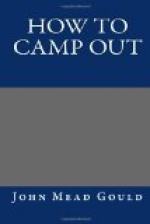If you are on a hillside, pitch your tent so that when you sleep, if you are to sleep on the ground, your feet will be lower than your head: you will roll all night, and perhaps roll out of the tent if you lie across the line running down hill.
As soon as you have pitched your tent, stretch a stout line from the front pole to the back one, near the top, upon which to hang your clothes. You can tighten this line by pulling inwards the foot of one pole before tying the line, and then lifting it back.
Do not put your clothes and bedding upon the bare ground: they grow damp very quickly. See, too, that the food is where ants will not get at it.
Do not forget to take two or three candles, and replenish your stock if you burn them: they sometimes are a prime necessity. Also do not pack them where you cannot easily find them in the dark. In a permanent camp you may be tempted to use a lantern with oil, and perhaps you will like it better than candles; but, when moving about, the lantern-lamp and oil-can will give you trouble. If you have no candlestick handy, you can use your pocket-knife, putting one blade in the bottom or side of the candle, and another blade into the ground or tent-pole. You can quickly cut a candlestick out of a potato, or can drive four nails in a block of wood.
If your candles get crushed, or if you have no candles, but have grease without salt in it, you can easily make a “slut” by putting the grease in a small shallow pan or saucer with a piece of wicking or cotton rag, one end of which shall be in the grease, and the other, which you light, held out of it. This is a poor substitute for daylight, and I advise you to rise and retire early (or “turn in” and “turn out” if you prefer): you will then have more daylight than you need.
BEDS.
Time used in making a bed is well spent. Never let yourself be persuaded that humps and hollows are good enough for a tired man. If you cut boughs, do not let large sticks go into the bed: only put in the smaller twigs and leaves. Try your bed before you “turn in,” and see if it is comfortable. In a permanent camp you ought to take time enough to keep the bed soft; and I like best for this purpose to carry a mattress when I can, or to take a sack and fill it with straw, shavings, boughs, or what not. This makes a much better bed, and can be taken out daily to the air and sun. By this I avoid the clutter there always is inside a tent filled with boughs; and, more than all, the ground or floor does not mould in damp weather, from the accumulation of rubbish on it.




